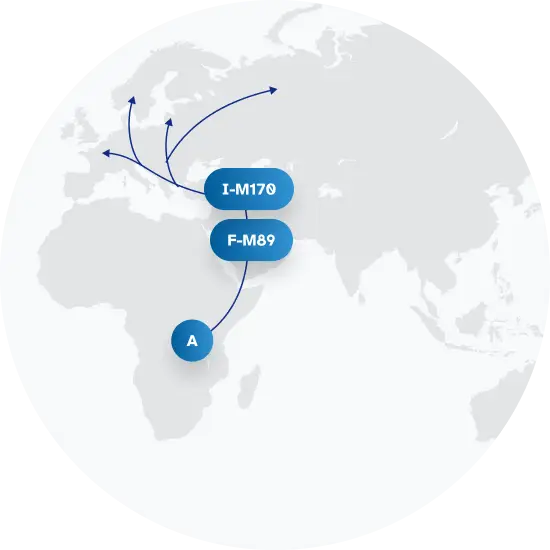Explore the Family Name Leger
How common is the last name Leger in the United States?
Based on the Decennial U.S. Census data, the popularity of the surname Leger has seen a modest increase between 2000 and 2010. The rank of the surname moved from 3541 in 2000 to 3497 in 2010, indicating a rise of 1.24%. In terms of count, there were 9,211 individuals with this surname in 2000 which increased to 10,221 by 2010, marking an increase of nearly 11%. This translates to a slight increase in the proportion per 100k from 3.41 to 3.46, again around 1.47% over the decade.
| 2000 | 2010 | Change | |
|---|---|---|---|
| Rank | #3,541 | #3,497 | 1.24% |
| Count | 9,211 | 10,221 | 10.97% |
| Proportion per 100k | 3.41 | 3.46 | 1.47% |
Race and Ethnicity of people with the last name Leger
The ethnic identity affiliated with the surname Leger also witnessed some shifts between 2000 and 2010, according to the Decennial U.S. Census data. The most significant changes were observed among those identifying as Asian/Pacific Islander and Black, with increases of 47.27% and 45.80% respectively. The proportion of people identifying as Hispanic also saw a rise of 21.34%. However, those identifying as White decreased by 5.75%, while the proportion of American Indian and Alaskan Native dropped significantly by 36.59%. The group identifying with two or more races saw a marginal increase of 2.44%.
| 2000 | 2010 | Change | |
|---|---|---|---|
| White | 84.51% | 79.65% | -5.75% |
| Black | 7.97% | 11.62% | 45.8% |
| Hispanic | 4.92% | 5.97% | 21.34% |
| Two or More Races | 1.64% | 1.68% | 2.44% |
| Asian/Pacific Islander | 0.55% | 0.81% | 47.27% |
| American Indian and Alaskan Native | 0.41% | 0.26% | -36.59% |
Leger ancestry composition
23andMe computes an ancestry breakdown for each customer. People may have ancestry from just one population or they may have ancestry from several populations. The most commonly-observed ancestry found in people with the surname Leger is British & Irish, which comprises 35.9% of all ancestry found in people with the surname. The next two most common ancestries are French & German (34.7%) and Spanish & Portuguese (9.6%). Additional ancestries include Italian, Scandinavian, Ashkenazi Jewish, Eastern European, and Indigenous American.
Ready to learn more about your ancestry? Get the most comprehensive ancestry breakdown on the market by taking our DNA test. Shop 23andMe
| ANCESTRY BREAKDOWN | COMPOSITION |
|---|---|
| British & Irish | 35.9% |
| French & German | 34.7% |
| Spanish & Portuguese | 9.6% |
| Other | 19.7% |

Possible origins of the surname Leger
Your DNA provides clues about where your recent ancestors may have lived. Having many distant relatives in the same location suggests that you may all share common ancestry there. Locations with many distant relatives can also be places where people have migrated recently, such as large cities. If a large number of individuals who share your surname have distant relatives in a specific area, it could indicate a connection between your surname and that location, stemming from either recent ancestral ties or migration.
Based on 23andMe data, people with last name Leger have recent ancestry locations in the United Kingdom of Great Britain and Northern Ireland and Ireland.
| RECENT ANCESTRY Location | Percentage |
|---|---|
| West Midlands, United Kingdom | 70.00% |
| Glasgow City, United Kingdom | 70.00% |
| Greater London, United Kingdom | 70.00% |
| Greater Manchester, United Kingdom | 69.50% |
| Merseyside, United Kingdom | 68.90% |
What Leger haplogroups can tell you
Haplogroups are genetic population groups that share a common ancestor on either your paternal or maternal line. These paternal and maternal haplogroups shed light on your genetic ancestry and help tell the story of your family.
The top paternal haplogroup of people with the surname Leger is I-S24121, which is predominantly found among people with European ancestry. Haplogroup I-S24121 is descended from haplogroup I-M170. Other common haplogroups include J-CTS5368 and R-L23, which are predominantly found among people with European and European ancestry. Other surnames with similar common haplogroups are: Graham, Morin, Mintz, Kahn, Cohen, Kaplan, Katz, Kohn, Jardine, Deutsch.
The most common maternal haplogroups of people with Leger surname are: H1, J1c, H. These most commonly trace back to individuals of European ancestry.
 Paternal Haplogroup Origins I-M170
Paternal Haplogroup Origins I-M170Your maternal lineage may be linked to the nomadic Tuareg of the Sahara
Though haplogroup H1 rarely reaches high frequencies beyond western Europe, over 60% of eastern Tuareg in Libya belong to haplogroup H1. The Tuareg call themselves the Imazghan, meaning “free people.” They are an isolated, semi-nomadic people who inhabit the West-Central Sahara and are known today for a distinctive dark blue turban worn by the men, and for their long history as gatekeepers of the desert.How did women carrying H1 make it all the way from western Europe to this isolated community? They likely migrated from Spain across the Strait of Gibraltar into Morocco after the Last Ice Age, where they were assimilated into the Berbers of the Mediterranean coast. Then, about 5,000 years ago, the Sahara shifted from a period of relative habitable conditions to its dramatically arid desert environment. This shift may have caused migrations throughout the Sahara, prompting the ancient Tuaregs to meet and mingle with the Berbers, bringing H1 lineages into their population.

What do people with the surname Leger have in common?
Spoiler alert: it's complicated. People with the same last name are usually no more genetically similar than a randomly sampled group of people from the same population. That said, people with the same surname are more likely to have similar ancestries than randomly sampled individuals. The reason is the tendency of people with similar cultural or geographical backgrounds to preferentially mate with one another. That's why people who share a surname may be more likely to share traits and tendencies in common than people within the general population. Check out the percentages below to see the prevalences of tastes, habits, and traits of people with your surname compared with prevalences among 23andMe users.
Preferences
Traits
Habits
Wellness
Are health conditions linked to the last name Leger?
The short answer is that, if there is an association between surname and health, it's usually more about your ancestry than your name. Individuals with a given surname are no more genetically similar than the general population but often have similar ancestries. The populations of people associated with those shared ancestries often have sets of genetic variations, also known as alleles, in common. Some of those alleles are associated with a greater likelihood of developing certain diseases.
Disease variant frequency by ancestry
Disease allele frequencies in populations associated with the surname Leger are shown below. Important Note: not everyone with a disease allele will develop these health condition






















